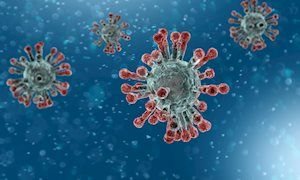
One in eight Dutch people have persistent symptoms after been diagnosed with COVID-19. This is the conclusion of researchers from UMC Groningen and Radboud university medical center after analyzing the health data of 13,000 Dutch people. They compared the symptoms of people before and after they had COVID-19. The study was published in the scientific journal The Lancet.
The researchers, including Tim olde Hartman of Radboud university medical center, used the Lifelines database for their large-scale study. This database has been used to collect data from a large group of Dutch people for fifteen years. The researchers compared the complaints that people had before and after their COVID-19 infection. They compared these complaints with those of people who did not become ill in the same period.
Comparing people who have had COVID-19 with those who have not had it shows that certain persistent symptoms are more common in the months following a COVID-19 infection. These symptoms include chest pain, loss of smell and taste, shortness of breath, fatigue, and muscle pain.
General practitioner Tim olde Hartman is researcher in the Department of Primary and Commuity Care at Radboud university medical center. He is a co-author and says: 'This is research that we have been waiting for for a long time. It finally clarifies which complaints specifically belong to post covid syndrome. In my practice I often see patients with symptoms after COVID-19, but some of them were also present before the covid infection. As a GP it is then difficult to determine which complaints can be attributed to covid and which cannot. This study helps us.'
Judith Rosmalen of UMCG: ‘We looked at how many participants developed symptoms or whose symptoms got worse after COVID-19 compared to how they felt before infection. We also looked at participants who did not have a COVID-19 infection in the same period so that we could consider changes in symptoms due to other causes. For example, due to seasons changing, people developing new diseases, or living conditions changing due to the pandemic and the restrictions. That is why data from the general population is indispensable.’
Search for causes of Long COVID
The follow-up research is focused on the causes of Long COVID. Based on the previously collected health data and materials from Lifelines, the team is investigating the risk factors for Long COVID. Lifelines offers the possibility to look for proteins in blood samples from participants that indicate organ damage or long-term inflammation caused by COVID-19. The researchers will also conduct extra tests on some of those with long-term symptoms.
Judith Rosmalen: ‘In some of the Lifelines participants with Long COVID, we want to measure thyroid function, perform an exercise test, determine autonomic nervous system function, and perform a number of other diagnostic tests. We also want to carefully examine lung function. Thanks to Lifelines, we have the results of lung function tests from recent years. We can compare the tests of people with Long COVID with those from before they became ill, and find out whether COVID-19 is causing a deterioration in lung function, whom that has happened to, and whether it is precisely those people who have persistent symptoms.’
Consequences of Long COVID
The team will also investigate to what extent people with Long COVID can still function, particularly at work. Rosmalen: ‘We are also asking what care people have received and how they have experienced it. The data will be used to develop care pathways to provide patients with the right care and to calculate the social costs, in terms of both medical costs and productivity loss.’
Impact and importance of health data
The Lifelines biobank has been collecting a wide range of health data from a large group of Dutch people for 15 years. At the end of March 2020, together with Lifelines, the UMCG and the University of Groningen started sending questionnaires to Lifelines participants.
Rosmalen explains: ‘Weekly, and later monthly, thousands of people were asked about COVID-19, psychological symptoms, living and working conditions, and many other topics. These lists also included questions about 23 physical symptoms. Due to this repetition and the multiplicity of questions, we now have a globally unique collection of health data for this research into Long COVID.’ A total of 27 questionnaires have since been sent out, which have been completed by an average of 35,000 people. In total, there are more than 900,000 questionnaires providing detailed information about the health of the Dutch population before, during, and after COVID-19 but also about the consequences for their wellbeing and daily functioning. These data are relevant for policy and for better care.
About the publication
This study has been published in The Lancet: Persistence of somatic symptoms after COVID-19 in the Netherlands: an observational cohort study – Aranka V. Ballering, Sander K.R. van Zon, Tim C. olde Hartman, Judith G.M. Rosmalen, for the Lifelines Corona Research Initiative.
-
Want to know more about these subjects? Click on the buttons below for more news.
More information
Pauline Dekhuijzen

wetenschaps- en persvoorlichter
Related news items

More than five million euros for research to improve palliative care Jeroen Hasselaar will lead research project with Horizon grant
15 June 2022 Jeroen Hasselaar will lead a large international research project. With a 5.3 million euro grant from the EU's Horizon program, he and his team want to improve palliative care for cancer patients, together with partners from nine European countries. go to page
Most COVID-19 ICU survivors experience symptoms one year after ICU admission Publication in JAMA
25 January 2022 75% of the COVID-19 survivors who were treated in the Intensive Care Unit (ICU) experience physical, mental and/or cognitive problems one-year post ICU. This shows the large-scale MONITOR-IC study led by Radboudumc. go to page
1.4 million euro to reduce hospital admissions due to medication
7 January 2022 A team of sixteen Dutch hospitals received a grant of 1.4 million euros from ZonMw. They will investigate whether they can reduce medication related hospital readmissions. go to page
Two million euros for improved treatment and outcomes of COVID-19 in the elderly
10 September 2021 ZonMw awarded a grant of nearly two million euros to a large group of researchers to improve the outcomes of elderly people with COVID-19. The study, in which the Radboudumc also participates, provides insight into the course and treatment of COVID-19 in the elderly. go to page

